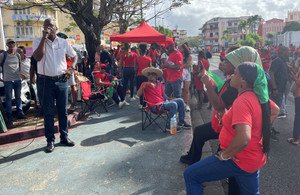Martinique begins trial of social protests' leader Petitot
Published by Global Banking & Finance Review®
Posted on January 21, 2025
3 min readLast updated: January 27, 2026

Published by Global Banking & Finance Review®
Posted on January 21, 2025
3 min readLast updated: January 27, 2026

Rodrigue Petitot, a protest leader in Martinique, faces trial for trespassing during demonstrations against high living costs, amid claims of suppression.
By Layli Foroudi
FORT-DE-FRANCE, Martinique (Reuters) - A protest leader in Martinique went on trial on Tuesday accused of trespassing on state property during cost-of-living demonstrations in a case his supporters say is another heavy-handed attempt to stop dissent in France's overseas territories.
Rodrigue Petitot, 42, known as “Le R”, led last year's social movement on the Caribbean island, where food is far more expensive and poverty levels double those of mainland France.
"The movement was gaining strength, and they needed to stop it," a co-accused activist, Gwladys Roger, told Reuters, saying political repression via courts had been used since the 1960s.
"When you want to kill a dog, you say it is rabid."
Petitot and three others are accused of intruding on the Martinique governor's residence during a Nov. 11 meeting with France's Overseas Territories Minister.
The activists, from the "Gathering for the Protection of Afro-Caribbean People and Resources" (RPPRAC), say they wanted to meet the minister and that a police officer let them in, court documents show. Red-shirted supporters gathered outside the tribunal for Petitot's two-day hearing.
The Prefecture of Martinique and the overseas territories ministry did not respond to requests for comment.
Martinique legislator Jiovanny William, who was at the Nov. 11 meeting, told Reuters he shared the activists' goal but not their method of trying to gain entry. “They wanted to force things but I regret that they didn’t work with parliamentarians,” he said.
One of Petitot’s lawyers, Eddy Arneton told Reuters he faced up to 20 years' jail if convicted due to his prior record.
“Mr Petitot was exercising his freedom of expression in that he wanted to attract the attention of the public and the authorities to the situation in Martinique and the purpose of this procedure is to repress a social movement,” he said.
'NEOCOLONIAL' REPRESSION?
Petitot was also sentenced to 10 months' prison in December for violence and intimidation over a TikTok video, in which he says they would “attack” mayors who do not take a stand against the governor Jean-Christophe Bouvier.
Petitot, who had that sentence changed to home confinement, says he did not mean physically attack.
The Martinique unrest was one of several recent flashpoints in French territories. An attempt to reduce the voting weight of indigenous Kanak people brought unrest in the Pacific ocean archipelago New Caledonia while a cyclone devastated Mayotte off East Africa, killing 39 and leaving thousands homeless.
Martinique was colonized by France in 1635 and, alongside Guadeloupe, French Guiana and La Reunion, made into a “department” by a 1946 law promising equality for territories.
However, poverty levels in Martinique are 27%, compared to 14% on mainland France, while food products were 40% higher in price in 2023, according to official French data.
Descendants of slave plantation owners, known as “bekes”, dominate the economy and hike margins, “which accentuates tensions,” said Sandrine Lemaire, a historian and author on French colonialism.
She said there was "neocolonial" repression of social movements in France’s overseas territories, citing the transfer of seven arrested Kanak leaders to a mainland prison 10,000 miles away.
Martinique was put under curfew from Oct. 10 to Nov. 4 last year due to the unrest, which turned violent with more than a hundred businesses targeted and burnt.
(Reporting by Layli Foroudi; Editing by Andrew Cawthorne)
The trial of Rodrigue Petitot, a protest leader in Martinique, for trespassing during cost-of-living demonstrations.
The protests in Martinique are against high living costs and poverty levels, which are significantly higher than in mainland France.
Supporters argue the trial is an attempt to suppress social movements in French overseas territories.
Explore more articles in the Headlines category


